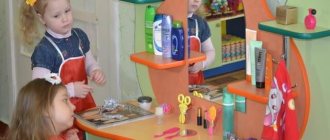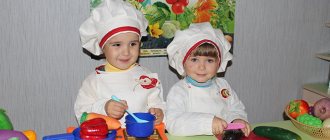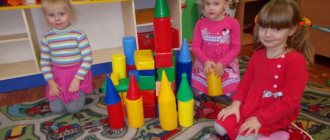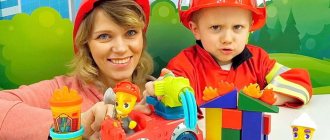What is role play for young children?
Children play role-playing games starting at about 2 years old. The child's partner in such a game may first be a parent or an older child. And from the age of 3 they play on their own or with other children. In the process, you can notice how much more the child opens up more and more, liberates himself, speaks more, shows more ingenuity and imagination. Of course, provided that he, in principle, plays such games, and this depends on the parents’ input.
At the beginning there will be a parent-child role play. For example, “mothers and daughters”. Well, who among us didn’t play this as a child? Or a game of buyer and seller. In such games, the child imagines himself in the place of a mother, a salesperson or a doctor, for example. In this way he tries to reproduce their actions and emotions. In such a game, a child not only puts a doll to sleep, but also learns to experience such feelings as care, tenderness, severity, and affection.
The feelings that a child acts out in such stories will manifest themselves in real life. That is, by losing care, it will be easier for such a baby to take care of someone in life.
Role-playing teaches real-life feelings and emotions.
And what is not unimportant, in such a role-playing game, we parents can see or hear things that can give us a lot to understand. For example, if in the game “kindergarten teacher”, your child in the role of teacher screams and hits children, this is a reason to think and worry. Where could he see such a pattern of behavior?
Role-playing games on the topic children come a little later, already in kindergarten. This is an important stage that helps the child to contact other children.
Preliminary work
Watching video clips of dance competitions.
A story about the professions involved in the creation of a dance show, an introduction to the concept of “festival”.
Excursion to the “House of Culture” to get acquainted with the dance group “Metelitsa” (observation of the rehearsal process, the style of communication between the choreographer and dancers, familiarization with the specifics of different genres of dance).
Didactic games “Name the profession” (name the profession by actions), “Come up with a dance” (listening to musical fragments, discussing the nature of the dance), dramatization game “Staging a dance” (creative reproduction of the actions of the choreographer and dancers).
Making game attributes with children (elements of dancers’ costumes, numbers of competition participants, signs for the jury).
Developing object-game environment: dancers’ costumes, costume elements (belts, belts, hairpins, brooches, etc.), numbers of festival participants, panels with ratings for the jury, presenter’s costume, performance script, discs with musical fragments.
What role-playing games provide for preschool children
- The child will not be bored alone. He will always be able to entertain himself with such a game, come up with and simulate a plot.
- It is easier for a child to adapt to school dramatizations. Since he already has the skills to play such role-playing games, it will not be difficult for him to take part in various events at school.
- The child will not have problems communicating or finding friends. Such active and sociable children become teachers' favorites.
- If a child is accustomed to communication, to adapting to any situation, then there should be no protests against school and studies. Children are more inclined to study.
- With the help of role-playing games, the child will more easily decide on his favorite school subjects, understand what he can do best and what he strives for. Children make their choice of future profession more confidently.
- Role-playing games help children develop the ability to think creatively and fantasize.
- He sets the goal of the game, goes to some pre-planned result. It's hard to argue with the value of this skill.
- During the game, the child learns to understand his feelings and emotions and cope with them.
- The vocabulary is continuously updated and enriched depending on the variety of scenarios.
- Role-playing games in a child's life develop his intellect.
Guiding role-playing games for children: where to start, how to organize the game
If your baby is now going to kindergarten or sitting with a nanny, then you can exhale, professionals will do all the work for you, or almost all of it. Role-playing games in kindergarten are organized by teachers; they know very well how to do it, what is needed for it, and most importantly, how to interest children in the game.
If everything is on your shoulders, then here are a few rules.
How to organize role-playing games for preschool children
- When is it time to start playing these story games? If your child has reached about three years of age and already has a good vocabulary.
- Selection of the plot. It's very simple. What is your child interested in? What toys does he like to play with the most? Ask your child what he wants to become in the future. Most often, children know the answer to this question. If not, read books on the topic “Choosing a profession.” This will guide you when choosing a topic.
- Having trouble deciding on a topic? No problem. The buyer-seller game always works. Children often watch your trips to the store, they know the procedure.
- Props. To fully immerse yourself in the situation, you need to select the necessary props. Well, for example, for the game “Seller-Buyer” you will need: a calculator as a cash register, money - it can just be pieces of paper or cut out numbers from the calendar. Envelope as a buyer's wallet. A set of “goods” for sale, it is advisable to select toys or items of a certain theme (stuffed toys, plastic fruits and vegetables, books).
- Preparing the props can be done together with the child. Involve him in the preparation, trust him to collect items for sale, or let him cut up pieces of paper for money.
- Before starting the game, make sure that your child really understands the plot, he is familiar with this situation, he understands the actions and words in this plot.
- You can play. But the game will be productive and rich only if not only the child, but you yourself want to play. If you are irritated by the long preparation and generally have your own things to do, the baby will feel it and the game will not work out.
- How often to play? Every day! This will only bring positive results. I repeat that the role of role-playing games in a child’s life is difficult to overestimate.
The more often a child plays such games, the more he develops business communication skills. That is, he is able to negotiate and convince, to win over to his side.
The second side of the coin: during the game, the child can get used to obeying. And this is precisely why parental participation is important at the initial stage. Parents should help a shy and timid child overcome his fear and take on the role of a leader. Here the child’s role in the role-playing game should be the main one, the leading one, but not all the time.
How to understand a child’s attitude towards role-playing games, whether they are beneficial and whether they develop the child
- The child himself asks you to play with him and takes the initiative in choosing a plot.
- The kid has memorized the basic phrases and can now use them in the game himself, without your prompting.
- The child sometimes independently plays with toys or other children in games that you played with him.
- Your child has begun to use improvised means in the game, adapting them to the plot.
- The kid understood what “make-believe” was.
Preliminary work
Conversations about the circus and its workers.
Watching cartoons: “Kashtanka”, “Well, wait a minute.”
Visit to the circus.
View illustrations about the circus.
Reading fiction: S.Ya. Marshak "Circus" Y. Kuklachev “My friends cats”; V. Dragunsky “Girl on a Ball”, “Circus”.
Games: “Choose masks for the clowns”, “Circus acts”, “Who needs what?”.
Production of attributes: posters, tickets, programs, signs, masks.
Developing object-game environment: posters, signs, tickets, programs, costume elements, attributes (spouts, caps, whistles, soap bubbles, “ears”, garlands, clown figures, flags, etc.); attributes for circus performers (ropes, hoops, balls, clubs, makeup, cosmetic sets, overalls for ticket takers, buffet workers, etc.).
Card index of role-playing games for children
Plot "Zoo"
Our goal: we replenish the child’s vocabulary, give knowledge about animals, teach their habits and sounds, and cultivate in children a love for animals.
Props: toy animals, cash register (a calculator will help you), tickets to enter the zoo, money (cut up pieces of paper), vegetables for the animals.
Plot of the game: We are going to the zoo, we go, we buy tickets at the box office, we walk around the zoo, the guide (mom or dad) tells the children about the animals, we feed the animals.
Plot "Kindergarten"
Our goal: to tell about the kindergarten, about its rules, about teachers and nannies, to teach children to take care in the role of educators.
Props: room (kindergarten) and all the necessary toys.
The plot of the game: we replay from the very beginning of the day, the trip to the garden, everything that usually happens in the garden, until the moment when the parents take the children home from the garden.
Plot “Public transport (bus)”
Our goal: to explain the tasks and responsibilities of the driver, conductor and passengers, to explain the rules of behavior in transport.
Props: chairs, tickets, money, driver’s cap
The plot of the game: we stand at the bus stop, wait for the bus, get on, buy a ticket, follow the rules of behavior, warn in advance about the desired stop.
Intended roles and game actions:
Main
Choreographer - comes up with a dance, selects dancers to implement his plan, works on staging the dances.
Dancers follow the choreographer’s recommendations, perform dances, and greet the audience with a bow before the start of the performance and after it ends.
The jury evaluates the performances of festival participants.
Presenter - conducts the performance: announces the composition of the jury, the names of the speakers, scores at the end of the performances, the names of the winners.
Minor
Sound engineer - works at the music control panel.
Costumer - prepares costumes for dancers, performs fittings.
Spectators are present at the performance, applauding the participants, discussing the performance among themselves.





